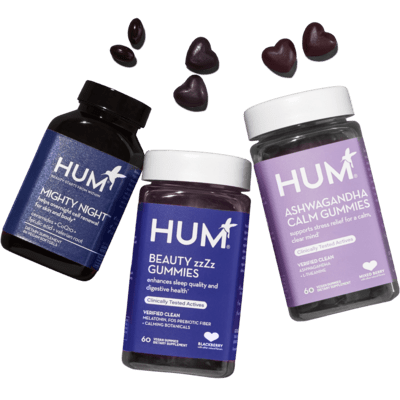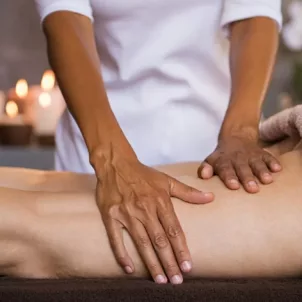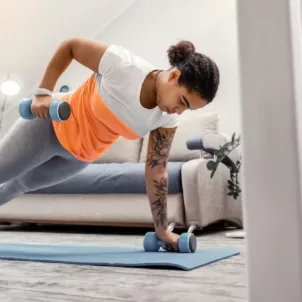Lauren Roxburgh, aka “the Body Whisperer,” teaches us how foam rolling works. Plus: the many impressive benefits of a daily foam rolling routine and her favorite moves.
Truth be told, I was a bit skeptical when I first heard about the miraculous benefits of foam rolling. Sure, I could conceptualize its ability to relieve tight muscles. But can it really make you slimmer, healthier, happier… and even taller?
To get answers, I reached out to Lauren Roxburgh, a board-certified structural integration practitioner with a background in exercise physiology. Lauren is a foam rolling expert, body alignment guru, and the go-to gal for all things physical wellness.
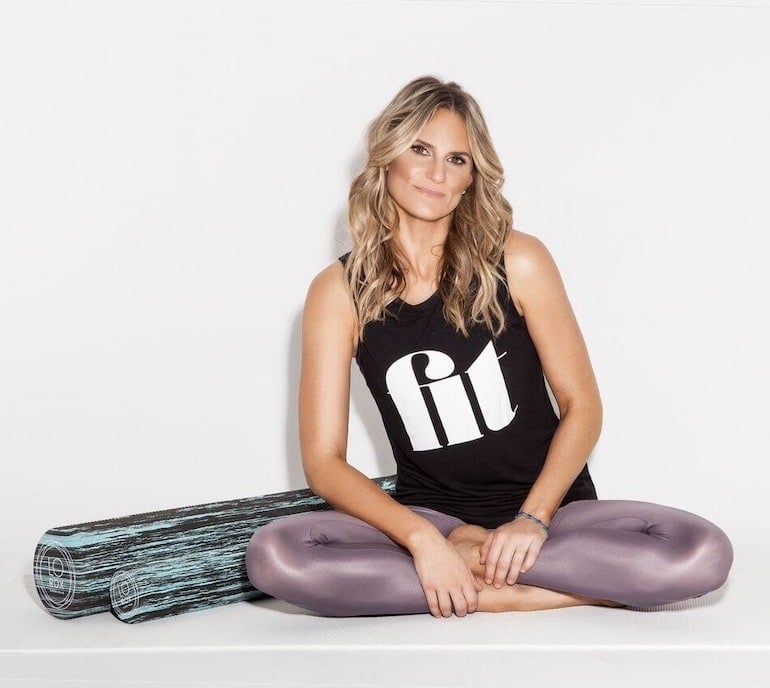



Foaming Rolling 101 with Lauren Roxburgh
It helps clear out toxins in the fascia
To better understand how foam rollers work on the body, Lauren makes the analogy of a rolling pin smoothing out dough. “The foam roller works in a similar way in that when you put weight on it, the pressure you feel as you move over the roller is smoothing out, hydrating, and healing your body’s tissues,” she explains. This pressurized movement “frees up blocked energy, wrings out toxins, and thins scar tissue, clearing stuck stress and emotions that build up in the fascia.” FYI: If you’re like me and forgot the basics from anatomy class, fascia is the thin layer of connective tissue that wraps around your body’s muscles and organs. It plays a major role in the body’s structure and alignment.Foam Rolling is incredibly versatile
Depending on which foam rolling techniques you use, the practice can encompass self-massage, stretching, recovery, and even a workout in its own right. “Rolling helps us shed stress while building long, lean, fluid, flexible, and strong muscles,” Lauren shares. Her own proprietary moves “mimic bodywork, healing, and also Pilates exercises, but without the need for studio sessions or bulky equipment.”Foam rolling Provides Countless BENEFITS
“Many people use a foam roller for pain management, or soreness from exercise and sitting,” Lauren begins. “However, the benefits of foam rolling extend far beyond this, and can reboot your entire system.” She shares many other physical benefits of foam rolling, which include:- improved circulation
- better posture
- lymphatic drainage
- joint lubrication
- reduced inflammation
- less bloating, constipation, and gas
- better digestion
- core stabilization
- reduced cellulite
- more supple, youthful skin
- increased flexibility and range of motion
- improved proprioception (brain-body connection)
- potential release of oxytocin (pain-relieving hormone)
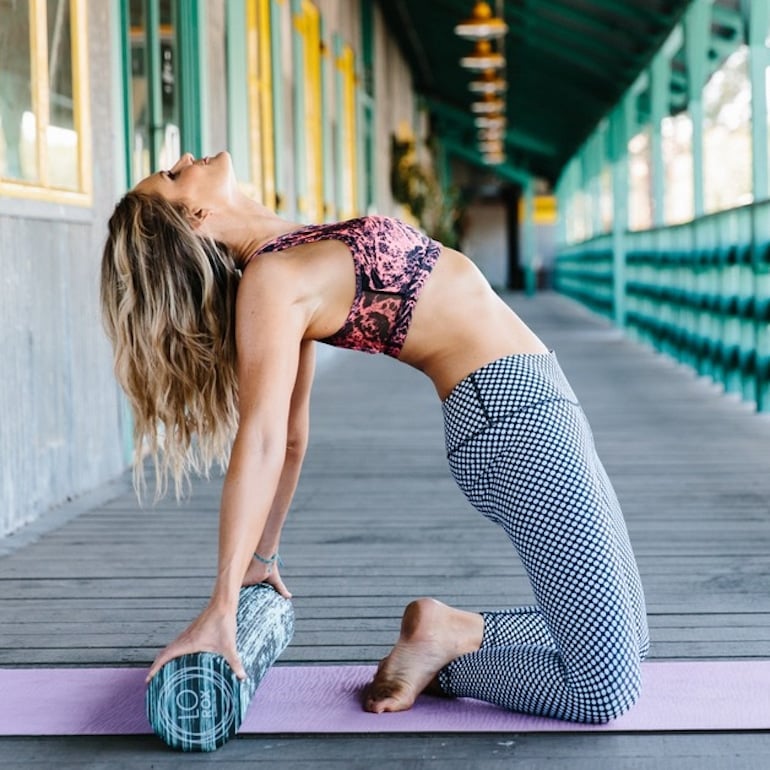
Some level of discomfort is normal
Lauren assures us that initial discomfort while foam rolling is normal, but pain isn’t. “It’s more about tuning in, connecting, and getting to the hurts-so-good feeling. So slow down, breathe, and stay present.” For more encouragement to stay the course, she recommends visualizing that with each roll, you’re peeling back pent-up layers of stress. Also, it’s worth noting that different foam rollers have varying levels of density. So the best foam rollers for beginners—or those who prefer more gentle pressure—should be on the softer side. With the right roller and technique, it should eventually feel good on your body. Note: If you have health issues, injuries, or are pregnant, consult your doctor before using a foam roller.Timing matters, but it’s flexible
How often should you foam roll, and for how long? “Use it every day if that feels right, or mix it in with whatever else you love to do,” Lauren answers. “My philosophy is all about finding balance and having fun.” At the very least, she advises integrating rolling into your fitness and wellness regimen at least a few times per week. (Her own transformation program designates 20 minutes a day over 10 weeks, with normal integration thereafter.) Of course, consistency is key to obtain lasting, visible results. Next, she’s often asked about the best time to roll. While many people think post-workout is ideal, “it’s actually best to do before a workout so you can awaken and prepare your body for movement.” Still, rolling afterwards helps alleviate any soreness. She also recommends rolling at the end of the day “to relax, unwind, and release tension. So many of us spend our days hunched over computer screens or cell phones. Even just taking five minutes to roll out the kinks can make a huge difference,” she shares.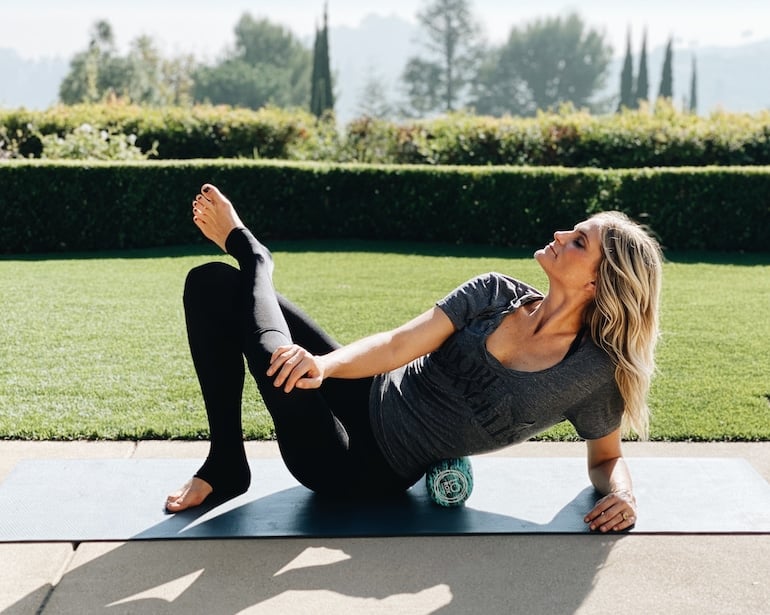
Lauren ROXBURGH’S Daily Foam Rolling Routine
Rolling Figure Four
- Sit on the roller and reach your right arm behind you, planting your right hand on the floor a few inches behind you.
- Cross your right ankle over your left knee in a figure-four position. Slightly shift your weight to the right hip/glute area, and roll back and forth a few inches in each direction for about 30 seconds.
- Spend another 30 seconds breathing as you roll in tiny circular movements.
- Repeat on the opposite side.
Roll Out the Kinks
- Lie on your back with your knees bent and your feet on the floor.
- Place the roller under your back at the bra line, leaning your mid-back over the roller.
- Gently interlace your fingers behind your head to support your head and neck.
- Using your feet to drive the movement, inhale as you roll up, stopping at the top of the shoulder blades.
- Exhale as you roll and massage down the spine, stopping at the bottom of your rib cage. (Be careful not to roll back and forth on the lower back.)
- Repeat 10 times.
Goddess Roll
- Start on your forearms with your belly facing the mat.
- Place the roller under your hips, with your feet together and knees wide. Keep your core engaged to prevent overarching your lower back.
- Exhale as you roll your body forward so that the foam roller moves down to just above your knees. Inhale as you roll back up.
- Repeat eight times.
Final Thoughts
The benefits of foam rolling are plentiful, and this self-care practice truly takes a mind-body approach to wellness. Lauren shares that while most of her clients go to her with physical concerns, the emotional and mental benefits inspire them to practice more often and consistently. “Many will feel more connected to their body and sensuality, have a more radiant glow, and a greater sense of ease and joy in both their bodies and lives,” she says. And who doesn’t want all of that? To get the star treatment, you can try out ImmUNITY, Lauren’s free program offering foam roller stretches, mat-based workouts, and recipes to fortify immunity and clear stress. As for my own initial skepticism? Call me a convert, because my new at-home routine is currently on a roll. For more wellness wisdom from Lauren Roxburgh, follow her on Instagram.More like this
